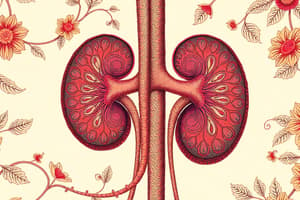Podcast
Questions and Answers
BLOOD TESTS A. ______ This assesses red blood cell count, white blood cell count, and platelet count, indicating potential complications like anemia or HELLP syndrome
BLOOD TESTS A. ______ This assesses red blood cell count, white blood cell count, and platelet count, indicating potential complications like anemia or HELLP syndrome
COMPLETE BLOOD COUNT
B. ______ These tests, like creatinine and blood urea nitrogen (BUN), assess kidney function, as hypertension can impact the kidneys
B. ______ These tests, like creatinine and blood urea nitrogen (BUN), assess kidney function, as hypertension can impact the kidneys
KIDNEY FUNCTION TESTS
C. ______ These tests, like alanine aminotransferase (ALT) and aspartate aminotransferase (AST), check for liver damage, another potential complication of pre-eclampsia
C. ______ These tests, like alanine aminotransferase (ALT) and aspartate aminotransferase (AST), check for liver damage, another potential complication of pre-eclampsia
LIVER FUNCTION TESTS
D. ______ These tests evaluate blood clotting function, crucial for monitoring potential bleeding risks
D. ______ These tests evaluate blood clotting function, crucial for monitoring potential bleeding risks
Drug of choice for pre-eclampsia 1. Hydralazine reduces blood pressure by relaxing the smooth muscles. The vasodilating effect reduces peripheral vascular resistance. Check BP every minute for 5 mins then every 5 mins for 30 mins. 2. Labetalol Hydrochloride is an alpha- and beta-blocker that decreases peripheral vascular resistance without significant change in cardiac output or causing tachycardia. Contraindicated with asthma and congestive heart failure. Closely monitor blood pressure after administration. 3. Methyldopa Interferes with chemical neurotransmission to reduce peripheral vascular resistance. Can cause CNS sedation, sleepiness, postural hypotension. ______
Drug of choice for pre-eclampsia 1. Hydralazine reduces blood pressure by relaxing the smooth muscles. The vasodilating effect reduces peripheral vascular resistance. Check BP every minute for 5 mins then every 5 mins for 30 mins. 2. Labetalol Hydrochloride is an alpha- and beta-blocker that decreases peripheral vascular resistance without significant change in cardiac output or causing tachycardia. Contraindicated with asthma and congestive heart failure. Closely monitor blood pressure after administration. 3. Methyldopa Interferes with chemical neurotransmission to reduce peripheral vascular resistance. Can cause CNS sedation, sleepiness, postural hypotension. ______
Pregnancy-induced hypertension occurs after __ weeks of gestation
Pregnancy-induced hypertension occurs after __ weeks of gestation
________ is a rise in blood pressure (≥140/90mmHg), without proteinuria, during the second half of pregnancy
________ is a rise in blood pressure (≥140/90mmHg), without proteinuria, during the second half of pregnancy
Placental Dysfunction is a key player in the pathophysiology of ________
Placental Dysfunction is a key player in the pathophysiology of ________
________ is the drug of choice for pre-eclampsia
________ is the drug of choice for pre-eclampsia
______ is the development of high blood pressure, swelling, or high levels of albumin in the urine between the 20th week of pregnancy and the end of the first week after delivery
______ is the development of high blood pressure, swelling, or high levels of albumin in the urine between the 20th week of pregnancy and the end of the first week after delivery
________ is a diagnostic test that can be used for patients with pregnancy-induced hypertension
________ is a diagnostic test that can be used for patients with pregnancy-induced hypertension
IV magnesium sulfate therapy is the initial choice for seizure prophylaxis in individuals with preeclampsia with severe symptoms. This test evaluates blood clotting function, crucial for monitoring potential bleeding risks.
IV magnesium sulfate therapy is the initial choice for seizure prophylaxis in individuals with preeclampsia with severe symptoms. This test evaluates blood clotting function, crucial for monitoring potential bleeding risks.
Creatinine and blood urea nitrogen (BUN) are examples of kidney function tests, as hypertension can impact the kidneys.
Creatinine and blood urea nitrogen (BUN) are examples of kidney function tests, as hypertension can impact the kidneys.
Alanine aminotransferase (ALT) and aspartate aminotransferase (AST) are examples of __________ tests, checking for liver damage, a potential complication of preeclampsia.
Alanine aminotransferase (ALT) and aspartate aminotransferase (AST) are examples of __________ tests, checking for liver damage, a potential complication of preeclampsia.
Hydralazine is one type of medicine used to raise blood pressure. Placental __________ results in insufficient blood and oxygen reaching the developing baby.
Hydralazine is one type of medicine used to raise blood pressure. Placental __________ results in insufficient blood and oxygen reaching the developing baby.
The placenta is an organ that develops in the uterus during pregnancy. This structure provides oxygen and nutrients to a growing baby. Medicines used to lower blood pressure are known as __________.
The placenta is an organ that develops in the uterus during pregnancy. This structure provides oxygen and nutrients to a growing baby. Medicines used to lower blood pressure are known as __________.
Low-dose aspirin has been used during pregnancy most commonly to prevent or delay the onset of preeclampsia. Betamethasone is used to speed fetal lung development. Intravenous magnesium sulfate therapy is the initial choice for seizure prophylaxis in individuals with preeclampsia with severe symptoms. This test assesses red blood cell count, white blood cell count, and platelet count, indicating potential complications like anemia or HELLP syndrome (liver and blood clotting issues). These tests, like creatinine and blood urea nitrogen (BUN), assess kidney function, as hypertension can impact the kidneys. These tests evaluate blood clotting function, crucial for monitoring potential bleeding risks. Hydralazine is one type of medicine used to raise blood pressure. Placental ischemia results in insufficient blood and oxygen reaching the developing baby. The placenta is an organ that develops in the uterus during pregnancy. This structure provides oxygen and nutrients to a growing baby. Medicines used to lower blood pressure are known as calcium.
Low-dose aspirin has been used during pregnancy most commonly to prevent or delay the onset of preeclampsia. Betamethasone is used to speed fetal lung development. Intravenous magnesium sulfate therapy is the initial choice for seizure prophylaxis in individuals with preeclampsia with severe symptoms. This test assesses red blood cell count, white blood cell count, and platelet count, indicating potential complications like anemia or HELLP syndrome (liver and blood clotting issues). These tests, like creatinine and blood urea nitrogen (BUN), assess kidney function, as hypertension can impact the kidneys. These tests evaluate blood clotting function, crucial for monitoring potential bleeding risks. Hydralazine is one type of medicine used to raise blood pressure. Placental ischemia results in insufficient blood and oxygen reaching the developing baby. The placenta is an organ that develops in the uterus during pregnancy. This structure provides oxygen and nutrients to a growing baby. Medicines used to lower blood pressure are known as calcium.
Flashcards are hidden until you start studying
Study Notes
Blood Tests
- Complete blood count evaluates red blood cell, white blood cell, and platelet levels, indicating potential issues like anemia or HELLP syndrome.
- Kidney function tests include creatinine and blood urea nitrogen (BUN), essential for assessing the impact of hypertension on kidney health.
- Liver function tests, such as alanine aminotransferase (ALT) and aspartate aminotransferase (AST), check for liver damage, a risk associated with pre-eclampsia.
- Coagulation tests assess blood clotting function, critical for identifying bleeding risks.
Drug Management for Pre-Eclampsia
- Hydralazine: Lowers blood pressure by inducing vasodilation and reducing peripheral vascular resistance; monitor BP closely (every minute for 5 mins, then every 5 mins for 30 mins).
- Labetalol Hydrochloride: Alpha and beta-blocker that decreases peripheral resistance without altering cardiac output; contraindicated in asthma and congestive heart failure; requires blood pressure monitoring post-administration.
- Methyldopa: Works by interfering with neurotransmission to lower peripheral vascular resistance; may cause central nervous system sedation and postural hypotension.
Key Conditions and Effects
- Pregnancy-induced hypertension can develop after 20 weeks of gestation.
- Gestational hypertension is characterized by elevated blood pressure (≥140/90 mmHg) in the second half of pregnancy without proteinuria.
- Placental dysfunction plays a significant role in the pathophysiology of pre-eclampsia.
- Pre-eclampsia is defined by high blood pressure and signs of organ dysfunction, often presenting with protein in the urine after the 20th week of pregnancy until one week postpartum.
- Diagnostic tests, including blood tests, help identify pregnancy-induced hypertension.
Related Terminology
- IV Magnesium Sulfate: First-line therapy for seizure prophylaxis in severe pre-eclampsia.
- Placental ischemia: Results in decreased blood and oxygen flow to the fetus, which can be detrimental to development.
- Medicines that lower blood pressure are termed antihypertensives.
- Low-dose aspirin is used to prevent or delay pre-eclampsia onset during pregnancy.
- Betamethasone: Administered to accelerate fetal lung development.
Summary of Blood Tests and Treatments
- Blood tests indicate potential complications like anemia and kidney/liver function status.
- Several drug options exist for managing pre-eclampsia, each with specific mechanisms and monitoring requirements.
- Understanding placental health and function is critical for addressing risks associated with pregnancy and pre-eclampsia.
Studying That Suits You
Use AI to generate personalized quizzes and flashcards to suit your learning preferences.





